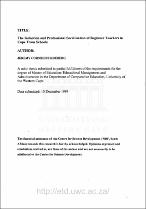The induction and professional socialisation of beginner teachers in Cape Town schools
Abstract
This study has its roots in my striving to become a competent teacher. Despite being armed with a teaching qualification, I found that I was ill-prepared for the rigours of the classroom and the broader school environment. It was in trying to rectify this situation that I realised that as a beginner teacher it seemed that I would have to find my own way through the myriad of problems and condemns that faced me in everyday practice. Was I alone in experiencing all these difficulties or were school environments into which beginner teachers were being inducted simply not supportive of addressing the needs and concerns of the newest members of the profession? Experience taught me that beginners received little or no support on entry to the profession. The research literature revealed a similar world-wide trend. The consequences of this situation was evident in the daily struggles within schools and together with a changing political arena in South Africa motivated this study into the induction and socialisation of beginner teachers in one district in Cape Town schools. A review of the literature revealed two major directions, a developmental tradition and a teacher socialisation tradition. Major trends internationally lean toward the development of induction programmes in line with the professional development/ effective schools philosophy to address the needs of beginners entering the profession. The emergence of professional development philosophy as the way forward in teacher education for beginning teachers is questioned in terms of its prescriptive nature and other shortcomings. These shortcomings include the strict research to policy formula as well as the deficit theory of beginning teacher problems and needs which fails to recognise the historical and contextual perspectives beginners bring with them into the profession. This is a direct result of the dominance of quantitative research in this field. The South African context is investigated by studying the possibilities of emerging educational policy for beginning teacher support. An analysis of the educational policy proposal literature reveals that the professional development roue is seen as the way forward in the South African context despite the emerging criticism from the teacher socialisation perspective. The complex school environment in South Africa that is undergoing transformation required a research approach that broke the dominance of the quantitative research methods to ensure that new perspectives emerged to provide balance to the solutions being advocated for beginning teacher problems and needs Therefore this study uses a qualitative technique in the form of a focus group interview to seek beginning teachers own meanings, views and interpretations of their problems and concerns. Their perspectives reveal a startling depth in terms of their understanding of the processes of induction and socialisation. This research study lays the basis for more qualitative research in the field to enhance resolution of poor and uncaring entry into the teaching profession and to assist in creating a teaching and learning culture in our schools.

